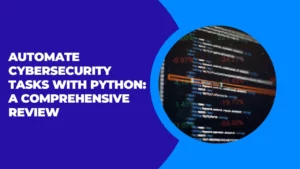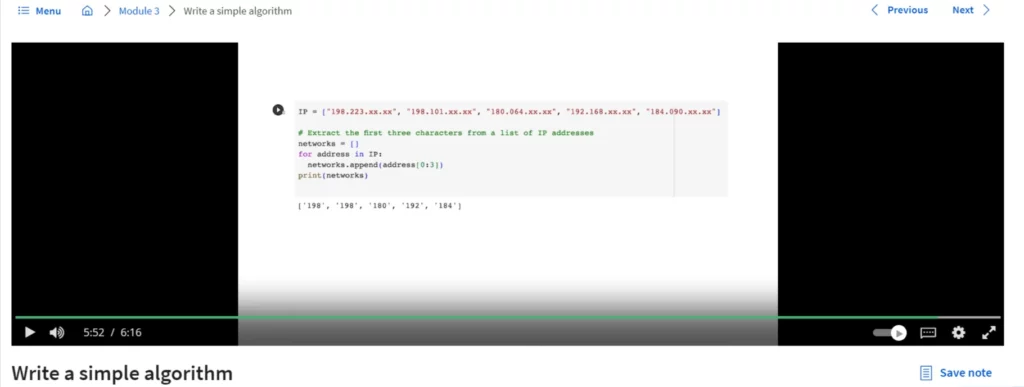Physical Address
304 North Cardinal St.
Dorchester Center, MA 02124
Physical Address
304 North Cardinal St.
Dorchester Center, MA 02124

Are you interested in learning how to automate cybersecurity tasks using Python? The “Automate Cybersecurity Tasks with Python” course from Google’s Cybersecurity Professional Certificate program might be exactly what you’re looking for.
In this in-depth review, we’ll take a close look at the course content, learning outcomes, and overall value to help you determine if it’s the right fit for your professional development goals.
| 🎓 Course: | Automate Cybersecurity Tasks with Python. |
| 📝 Description: | Comprehensive Python for Cybersecurity Automation: Boost Efficiency, Reduce Errors, Advance Your Career. |
| 👨🏫 Instructor: | Google. |
| 🔍 Skills Gained: | Python programming, Cybersecurity automation, File handling, Debugging, Readability, Regex and Algorithms. |
| ⌚ Duration: | Python programming, Cybersecurity automation, File handling, Debugging, Readability, Regex, and Algorithms. |
| 📌 Action: | Enroll Now for Free! |
| ⭐ Rating: | 4.8 ⭐ (1,382 reviews) – 115,550 already enrolled. |
Cybersecurity is a rapidly evolving field that requires a versatile skillset. As a cybersecurity professional, you need to be able to not only identify and respond to threats, but also streamline repetitive tasks to work more efficiently.
One powerful tool for automating cybersecurity workflows is the Python programming language. Python’s simplicity, flexibility, and vast ecosystem of libraries make it an excellent choice for automating a wide range of security-related tasks, from network monitoring and vulnerability scanning to incident response and threat hunting.
By learning to leverage Python in your cybersecurity work, you can save time, reduce the risk of human error, and free up your time to focus on more complex, high-impact tasks. This can be a game-changer, especially for those new to the field or working in resource-constrained environments.

The “Automate Cybersecurity Tasks with Python” course is the seventh course in the Google Cybersecurity Professional Certificate program. It is designed to provide a comprehensive introduction to using Python in a cybersecurity context.
Here’s a breakdown of the course modules and the key skills you’ll develop:
Throughout the course, you’ll have the opportunity to apply your newfound Python skills through hands-on labs and projects that simulate real-world cybersecurity scenarios. This practical experience is invaluable for reinforcing your learning and preparing you for the challenges you’ll face as a cybersecurity professional.
Also Read: Google Cybersecurity Certification Review: Is It Worth It?
Course:
Instructor:
Recommendation:
The “Automate Cybersecurity Tasks with Python” course is designed for individuals who are new to both cybersecurity and Python programming. It assumes no prior experience in either field, making it an excellent starting point for those looking to enter the cybersecurity industry or expand their skill set.
Whether you’re a career-changer, a recent graduate, or an aspiring cybersecurity professional, this course can provide you with the foundational knowledge and practical skills you need to begin automating cybersecurity tasks using Python.
It’s worth noting that while the course is beginner-friendly, it still offers substantial value for more experienced cybersecurity practitioners. Even if you have some coding experience, you may discover new techniques, libraries, or best practices that can enhance your Python-based automation capabilities.

The “Automate Cybersecurity Tasks with Python” course is delivered entirely online through the Coursera platform. It consists of approximately 30 hours of content, which you can complete at your own pace within a flexible schedule.
The course is divided into four modules, each of which includes a mix of video lectures, readings, quizzes, and hands-on labs. Here’s a closer look at the content and structure:
| Module | Key Topics |
|---|---|
| 1. Introduction to Python Programming in Cybersecurity | – Python and cybersecurity – Data types, variables, conditional statements, and iterative statements |
| 2. Python Functions, Modules, and Readability | – Pre-built and user-defined functions – Working with modules and libraries – Improving code readability |
| 3. Working with Strings, Lists, and Regular Expressions | – String and list operations – Developing algorithms – Using regular expressions |
| 4. Automating Cybersecurity Tasks with Python | – Automating common cybersecurity tasks – Working with files (importing, parsing, updating) – Debugging strategies |
Each module includes a combination of video lectures, reading materials, quizzes, and hands-on labs to reinforce your understanding and application of the concepts covered.
The course also features several guest appearances from Google employees currently working in the cybersecurity field. These industry experts provide valuable insights and real-world examples to supplement the course content.

By the end of the “Automate Cybersecurity Tasks with Python” course, you’ll be able to:
These skills are directly applicable to a wide range of cybersecurity tasks, from network monitoring and threat detection to incident response and vulnerability management. By mastering these Python-based techniques, you’ll be well-equipped to streamline your workflows, improve efficiency, and make a greater impact in your cybersecurity role.
Upon successful completion of the “Automate Cybersecurity Tasks with Python” course, you’ll receive a shareable certificate from Google. This credential can be added to your LinkedIn profile, resume, or CV, demonstrating your expertise in using Python for cybersecurity automation.
The course is part of the larger Google Cybersecurity Professional Certificate program, which is designed to prepare you for entry-level cybersecurity roles. By completing the full certificate, you’ll gain a comprehensive understanding of the cybersecurity field and the skills needed to apply for jobs such as:
The Google Cybersecurity Professional Certificate is recognized by industry leaders and can help you stand out in the job market, making it an attractive option for those looking to launch or advance their cybersecurity careers.
Pros:
Cons:
Overall, the “Automate Cybersecurity Tasks with Python” course from Google’s Cybersecurity Professional Certificate program is an excellent investment for anyone interested in learning how to leverage Python for cybersecurity automation.
The course provides a solid foundation in Python programming and its applications in the cybersecurity field, making it a valuable resource for both beginners and experienced practitioners looking to expand their skills.
The practical, hands-on approach and industry-relevant content ensure that you’ll gain immediately applicable skills that can be put to use in real-world cybersecurity scenarios. And the shareable certificate can help you stand out in the job market, opening up new career opportunities in the growing field of cybersecurity.
If you’re ready to take your cybersecurity skills to the next level and discover the power of automation using Python, this course is definitely worth considering. With its comprehensive curriculum, experienced instructors, and flexible online format, it’s an excellent choice for anyone looking to future-proof their cybersecurity career.
The “Automate Cybersecurity Tasks with Python” course from Google’s Cybersecurity Professional Certificate program can be a valuable asset for your career in several ways:
The “Automate Cybersecurity Tasks with Python” course is designed for individuals with little to no prior experience in both cybersecurity and Python programming. The course assumes no previous knowledge and starts from the ground up, making it an excellent choice for those new to the field.
Whether you’re a career-changer, a recent graduate, or an aspiring cybersecurity professional, this course can provide you with the foundational skills and knowledge needed to begin automating cybersecurity tasks using Python.
That said, the course can also benefit more experienced cybersecurity practitioners who are looking to expand their Python-based automation capabilities. Even if you have some coding experience, you may discover new techniques, libraries, or best practices that can enhance your existing skillset.
By the end of the “Automate Cybersecurity Tasks with Python” course, you will have developed a comprehensive set of skills that are directly applicable to cybersecurity automation tasks, including:
These skills will enable you to streamline your cybersecurity workflows, improve efficiency, and make a greater impact in your role as a cybersecurity professional.
The “Automate Cybersecurity Tasks with Python” course is delivered entirely online through the Coursera platform and is structured into four comprehensive modules:
Each module includes a mix of video lectures, readings, quizzes, hands-on labs, and discussion prompts to reinforce your learning and ensure you can apply the concepts in practical, real-world scenarios.
Completing the “Automate Cybersecurity Tasks with Python” course, as part of the larger Google Cybersecurity Professional Certificate program, can open up a wide range of entry-level cybersecurity job opportunities.
Some of the roles you may be qualified for after successfully completing the program include:
The Google Cybersecurity Professional Certificate is recognized by industry leaders and can help you stand out in the job market, as it demonstrates your expertise in using Python for cybersecurity automation and your commitment to continuous learning and professional development.
Moreover, the practical skills you’ll acquire, such as automating repetitive tasks, working with files and data, and effectively debugging code, are highly sought-after by employers in the cybersecurity field.
The “Automate Cybersecurity Tasks with Python” course from Google’s Cybersecurity Professional Certificate program is an excellent investment for anyone interested in learning how to leverage Python for cybersecurity automation. By completing this course, you’ll gain a solid foundation in Python programming and its applications in the cybersecurity field, preparing you for a wide range of entry-level roles. With its comprehensive curriculum, experienced instructors, and flexible online format, this course is an exceptional choice for those looking to future-proof their cybersecurity career.
| 🎓 Course: | Automate Cybersecurity Tasks with Python. |
| 📝 Description: | Comprehensive Python for Cybersecurity Automation: Boost Efficiency, Reduce Errors, Advance Your Career. |
| 👨🏫 Instructor: | Google. |
| 🔍 Skills Gained: | Python programming, Cybersecurity automation, File handling, Debugging, Readability, Regex and Algorithms. |
| ⌚ Duration: | Python programming, Cybersecurity automation, File handling, Debugging, Readability, Regex, and Algorithms. |
| 📌 Action: | Enroll Now for Free! |
| ⭐ Rating: | 4.8 ⭐ (1,382 reviews) – 115,550 already enrolled. |